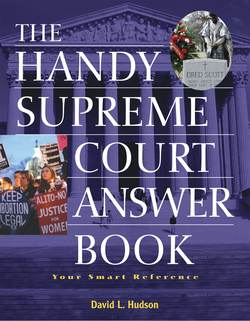Читать книгу The Handy Supreme Court Answer Book - David L Hudson - Страница 239
На сайте Литреса книга снята с продажи.
In what decision did the Marshall Court refuse to apply the Fifth Amendment protection of just compensation to the states?
ОглавлениеThe Marshall Court ruled in Barron v. Baltimore (1833) that the Fifth Amendment only protected individuals from the federal government, not state and local governments. The case arose after John Barron claimed that excavating by the city had destroyed his family’s wharf. Barron sued in state court, claiming that the city should pay him for the damage. He argued that he was protected by the Fifth Amendment Clause, which provides that “private property [shall not] be taken, without just compensation.” A jury awarded him $4,500 but the state supreme court reversed.
Barron appealed to the U.S. Supreme Court, where Chief Justice Marshall ruled that the Fifth Amendment did not extend to the states. He wrote that if the Founders had wanted the Bill of Rights to extend to the states, “they would have declared this purpose in plain and intelligible language.” The Fifth Amendment right to just compensation, like the vast majority of other provisions in the Bill of Rights, was eventually extended to apply to the states by the adoption of the Fourteenth Amendment in 1868 and a series of later U.S. Supreme Court decisions. The Fourteenth Amendment contains the Due Process Clause, which provides that “no state shall deny any person life, liberty or property without due process of law.” Thus, Barron would have a Fifth Amendment claim today but he did not in 1833 when there was no Fourteenth Amendment.
